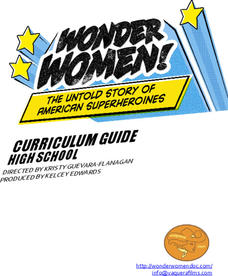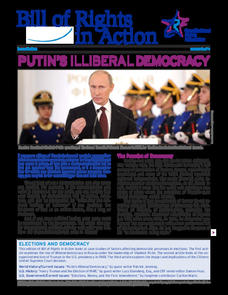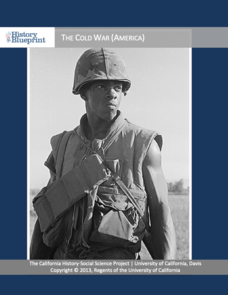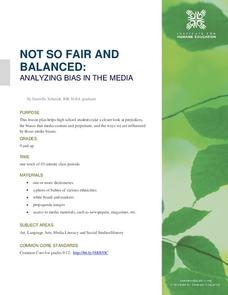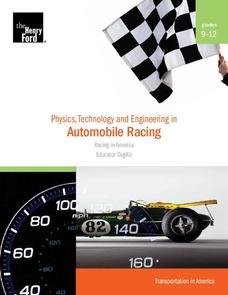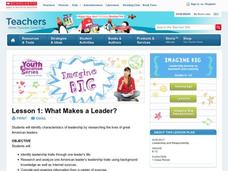American Institute of Physics
African American Inventors in History
A two-part lesson plan introduces young historians to the work of famous African American inventors. Groups first research and develop a presentation of an inventor that includes biographical information and information about one of...
Bonneville
Macro-Scale Solar
There's no substitute for the power of the sun. The second of four installments of the Solar Resources Assessment unit looks at macro-scale photovoltaic (PV) technology. Future scientists first learn about PV modules with a PowerPoint...
Bonneville
Introduction to the Photovoltaic Effect
Let a video light the way to a better understanding of solar energy. Scholars first learn vocabulary terms related to the photovoltaic effect, solar cells, and electricity. They then watch a video to learn why silicon is often used as a...
Vaquera Films
Wonder Women - The Untold Story of American Superheroines: High School Curriculum Guide
A 41-page curriculum guide tells the story of the untold stories of American Superheroines! Divided into three modules, the guide is designed to be used before, during, and after viewing the 2012 documentary Wonder Women! The Untold...
Constitutional Rights Foundation
The Dispute Over the South China Sea
Just who owns the South China Sea—and its vast resources—has been a conundrum for decades. Pupils explore the international law and disputes surrounding the resource-rich body of water, as well as China's claims over it. A background...
Constitutional Rights Foundation
Putin's Illiberal Democracy
Is Russia really a democracy? High school scholars explore Russian democracy under the leadership of President Putin. The resource provides opportunity for group discussion, writing, and research to understand Russia's political history,...
National Academy of Sciences
Lights at Night Webquest
Help learners find ways to become more efficient energy consumers. To start, individuals research how different countries address energy efficiency and then analyze their own carbon footprint. They use their research to identify ways to...
University of California
The Cold War (America)
The Cold War—with its roots in World War II—impacts the world today. Using an extensive curriculum, scholars consider its impact through primary sources, including speeches and propaganda, as well as other skills-enhancing activities. An...
Echoes & Reflections
Perpetrators, Collaborators, and Bystanders
After the Holocaust, the world grappled with how to bring justice to the Nazis. But what to do with the thousands—if not millions—who allowed it to happen? Young historians consider the issues of guilt, collaboration, and responsibility...
Institute for Humane Education
Not So Fair and Balanced: Analyzing Bias in the Media
Life is not always fair. Who's heard that before? This same concept moves to a larger scale using prejudice and bias. Pupils discuss where prejudice attitudes derive and how they develop throughout life. Reading comprehension...
Society for Science & the Public
Easter Islanders Made Tools, Not War
When studying artifacts, especially tools, how do archaeologists determine what the devices were used for? In what ways might researchers' previous experiences influence their perception of an artifact? An article about researchers'...
University of North Carolina
Policy Brief
Not all writing assignments take the form of an essay. When it comes to politics, it's all about policy briefs. This type of writing is the topic of an informative handout, which is part of a larger series on specific writing...
Constitutional Rights Foundation
The Election of 1912
The Election of 1912: an election with four competitive opponents. Pupils get to know the candidates with informative reading passages that provide context to the election. Then, the class engages in a debate and answers questions as one...
Howard Hughes Medical Institute
Gorongosa: Scientific Inquiry and Data Analysis
How does the scientific process begin? Introduce ecology scholars to scientific inquiry through an insightful, data-driven lesson. Partners examine data from an ongoing research study to determine the questions it answers. The resource...
Howard Hughes Medical Institute
Human Impacts on Biodiversity
Have you always wanted to take your science class on an amazing field trip they will never forget? Now you can! Observe the wildlife in an African savanna through trail cameras with a five-part data analysis activity. Learners analyze...
Henry Ford Museum
Sustainability: Environmental Management and Responsible Manufacturing
When you think about environmental sustainability, the Ford Motor Company probably isn't the first company to come to mind. A four-lesson unit introduces learners to the idea of sustainability and environmental stewardship. It describes...
Library of Congress
Thomas Jefferson's Library: Making the Case for a National Library
The United States Library of Congress, the largest library in the world. But such was not always the case. The library was destroyed during the War of 1812. In a persuasive letter to Samuel H. Smith, Thomas Jefferson offered to sell his...
NOAA
Off Base
How does carbon dioxide affect the world's oceans? The final installment in a series of six lessons has pupils research ocean acidification, then conduct an experiment to witness the delicate balance that exists in our seas. Materials...
Federal Reserve Bank
Lesson 2: In the Aftermath
Don't wait for a crisis to get your finances together. An economics lesson demonstrates the importance of understanding crucial documents, banking basics, and financial tools with the focus on Hurricane Katrina in 2005 and its effects.
Curated OER
Fracking: Positive or Negative Impact?
Your teenagers may have heard of fracking, but do they really know what it is? And could they debate the benefits and risks? Educate your environmental science class with a lesson about hydraulic fracturing, non-renewable energy...
Henry Ford Museum
Physics, Technology and Engineering in Automobile Racing
Start your engines! This five-lesson unit introduces physics and Newton's laws through automobile racing. Each lesson includes background information, a student worksheet, and an answer key. There are also culminating...
Mrs. Burgess
End of the Year Geometry Projects
Geometry students will be ecstatic about these engaging and enlightening end-of-the-year projects! Types of project ideas include interviewing a geometer, an ABCs of geometry poster, an engineering lab report, and origami work.
Scholastic
What Makes a Leader?
After creating a list of great American leaders from the last century and researching their lives, pupils will brainstorm aspects of leadership and discuss what traits may be shared by all leaders.
Northeastern Educational Television of Ohio, Inc.
Feudalism Research
Working with a partner, young historians research different feudal roles in medieval Europe (i.e. nobles, knights, clergy, tradesmen, and peasants), create a fact sheet about their assigned roles, and present their findings to the class.





